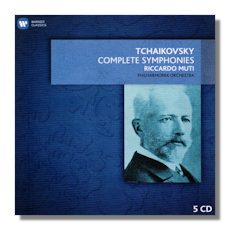
The Internet's Premier Classical Music Source
Related Links
- Tchaikovsky Reviews
- Latest Reviews
- More Reviews
-
By Composer
-
Collections
DVD & Blu-ray
Books
Concert Reviews
Articles/Interviews
Software
Audio
Search Amazon
Recommended Links
Site News
 CD Review
CD Review
Piotr Ilyitch Tchaikovsky

Complete Symphonies
- Symphony #1 in G minor "Winter Daydreams", Op. 13 (1874) **
- Symphony #2 in C minor "Little Russian", Op. 17 (1872)
- Symphony #3 in D Major "Polish", Op. 29 (1875)
- Symphony #4 in F minor, Op. 36 (1878)
- Symphony #5 in E minor, Op. 64 (1888)
- Symphony #6 in B minor "Pathétique", Op. 74 (1893)
- Symphony in B minor "Manfred", Op. 58 (1884)
- Symphonic Fantasy in E minor "Francesca Da Rimini", Op. 32 (1876) *
- Fantasy Overture in B minor "Romeo & Juliet" (1869)
- Overture solennelle in E Flat Major "1812", Op. 49 (1880) *
* Philadelphia Orchestra/Riccardo Muti
** New Philharmonia Orchestra/Riccardo Muti
Philharmonia Orchestra/Riccardo Muti
Warner Classics 08256-46278-2 5CDs ADD/DDD
Now that Warner Classics officially has control of the EMI back catalog, it's been interesting to see how they've handled reissues. For the most part, they have been content to slap a "Warner" label on the back of best-selling box sets and leave it at that. Since that's not the case with this particular box, we'll clear some things up off the bat. Yes, there is another set on the market that also contains these performances, though it adds more fillers from Philadelphia and thus costs more. For those chiefly interested in Muti's excellent Philharmonia recordings, I suspect the present issue will suffice. And yes, these performances have been around on Brilliant Classics. Should you have that set, you don't need either of the Warner boxes. Finally, though the box lists the Philharmonia and New Philharmonia as separate ensembles, they are not. The New Philharmonia only existed from 1964-1977. It's a case of the same country flying under different flags, so to speak. Don't let this confuse you.
The recordings themselves are a thrill, though they won't be to all tastes. To my ears, they are the anti-Haitink (Decca 4785867). Where Haitink is all polish and flair, Muti storms unapologetically through Tchaikovsky's symphonic canon. Mind you, there are many lovely things to appreciate, not least the Philharmonia in prime form. The fillers also showcase some of Muti's best work in Philadelphia, with a red-hot Francesca and a thrilling 1812. Muti's operatic mastery allows a delightfully cantabile approach to the soaring melodies the composer gave us, while the brass is brazen and stunningly present. The early symphonies sound stunning, the later ones no less so. There's tremendous energy throughout, and occasionally the playing borders on unsubtle. But the classic Philharmonia sound manifests itself in some breathtakingly forward wind playing, and a thankfully powerful lower half of the orchestra. Muti finds so many great details, and fears none of this music. For example, he's completely willing to "let go" for Manfred, while other conductors can't seem to take the risk. In the 1812 Overture, he balances the music's beauty and vulgarity better than anyone save Doráti, and he handles Tchaikovsky's occasionally awkward transitions with grace and ease. The EMI sound is tremendously rewarding, allowing you to hear all that I've listed and more. For great Tchaikovsky, you could do far worse than this consistently satisfying and space-saving box.
Copyright © 2015, Brian Wigman




















